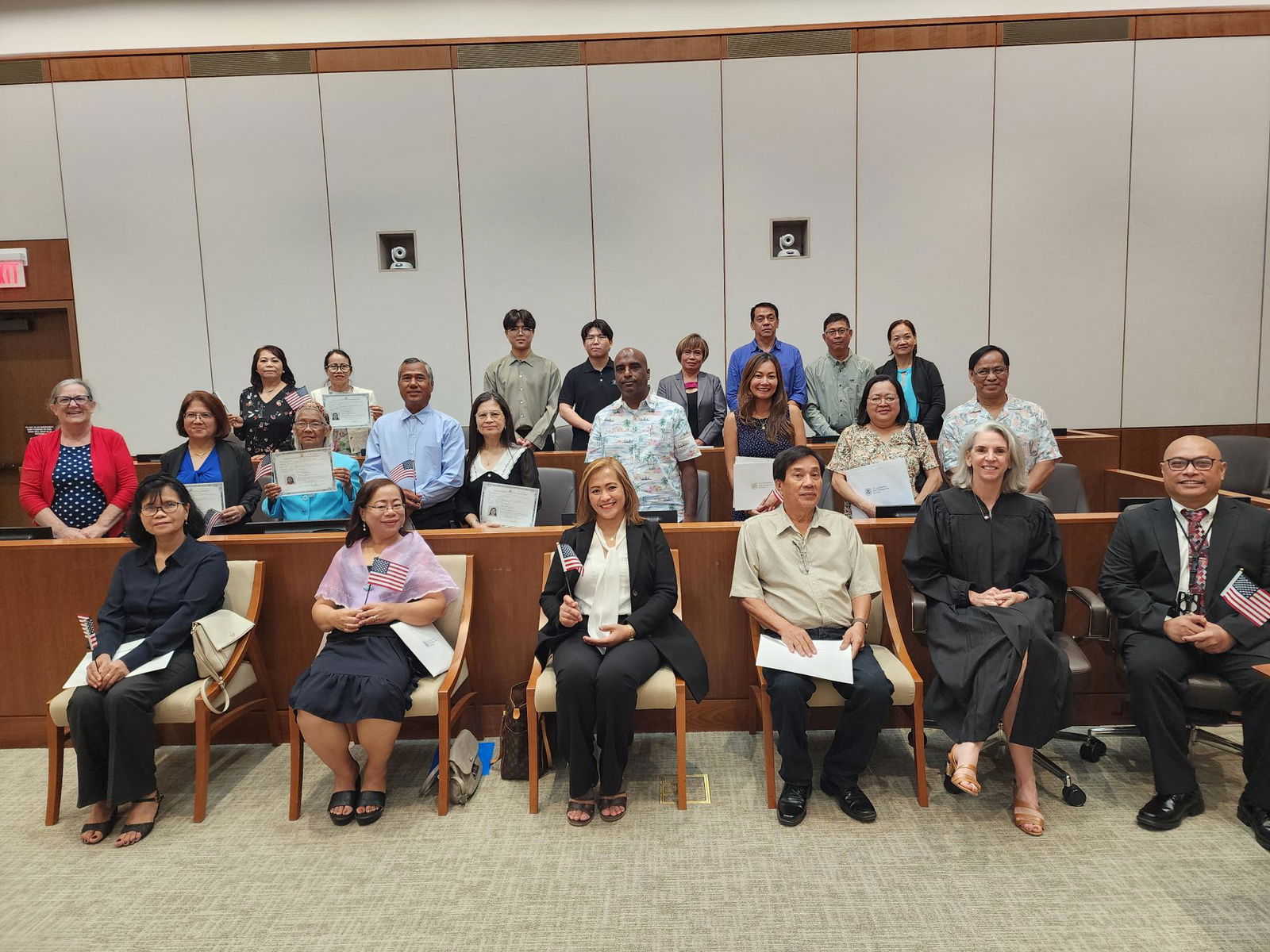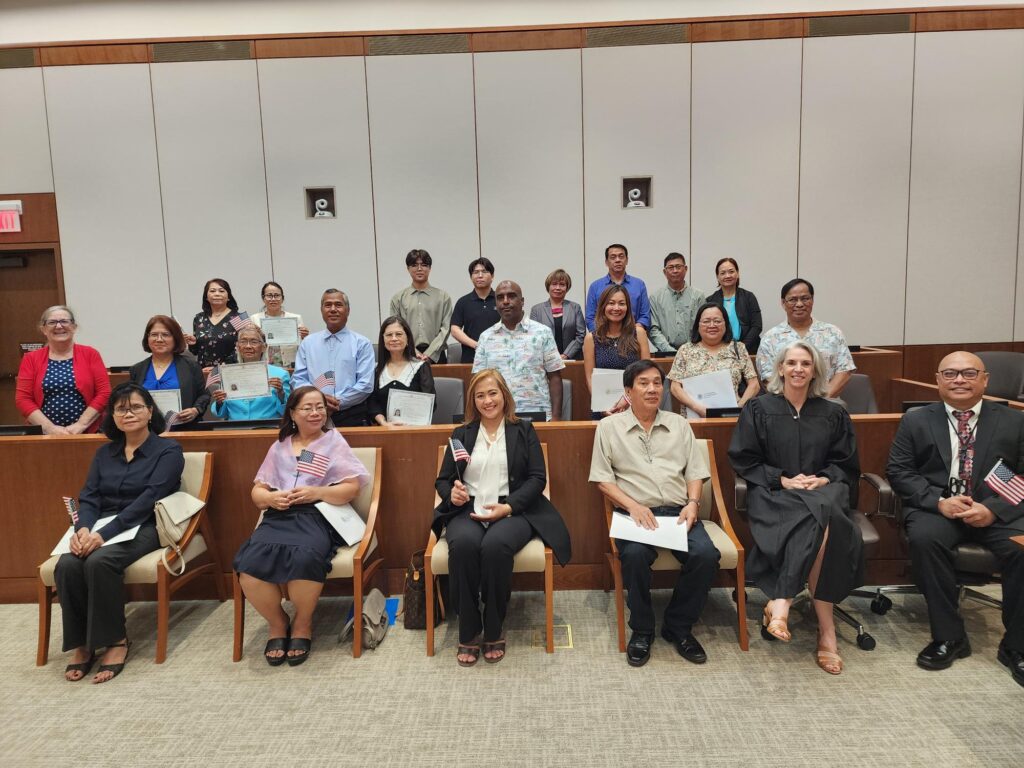
The 20 new U.S. citizens pose for a photo with District Court for the NMI Magistrate Judge Heather Kennedy, District Court IT security officer Dr. Jonathan Liwag and U.S. Citizenship and Immigration Services Officer Patricia Phelan.
TWENTY new U.S. citizens were sworn in at a naturalization ceremony in federal court on Thursday.
Patricia Phelan, U.S. Citizenship and Immigration Services officer, made a motion in court to accept the applicants as new citizens. Presiding over the special court session, District Court for the NMI Magistrate Judge Heather Kennedy granted the motion and welcomed the new U.S. citizens to the American family.
They are Girlie Papua Ada, Mahesh Balakrishnan, Evelyn Santos Batac, Ronaldo Garcia Batac, Macrino Quinones Carreon, Alanie Tupil Castro, Ricardo Galang Castro, Jose Paras Dayrit Jr., Paz Lozo Echavez, Wilfredo Arcon Echavez, Irene Nepomuceno Holl, Maria Martinez Javier, Maureen Javier Javier, Somphathipsadavanh Insisiengmay Jordahl, Saturnina Palmes Mesa, Esther Domino Manzano, Marivic Gonzales Pascual, Shirley De Oval Quiblat, Hawon Seo and Hayoung Seo.
Dr. Jonathan Liwag, the District Court’s IT security officer, was the guest speaker.
“I work here in the District Court and these naturalization ceremonies are my favorite occasions because these are the events when everybody comes out of the court very happy,” Liwag said.
He added, “I was not born a citizen of this country. I came to Saipan when I was very young, but I learned the principles and values of being an American. My family, like some families that came here, were foreign workers. I started anew in a new place equipped with the only English I learned from Sesame Street and other American TV shows broadcasted in the Philippines. As a young boy, I joined the Boy Scouts of America and recited the Pledge of Allegiance, the same one that you take here today. Those words made a real impression in my heart and memory as a young child. I experienced first-hand the concepts of liberty and responsibility before anything about laws and immigration. Moving to this country and leaving my birthplace was a challenge and a struggle, but this journey gave us a special appreciation for our new home. Even though we left behind friends, family and things we had grown accustomed to, they were replaced with opportunity and great possibility.”
“America is a fusion of cultures and people,” Liwag said. “People from all over the world are making this country great. We bring the best of what we can offer from our respective countries. The United States is still a land of opportunities if you’re willing to work hard and help build this great nation,” he added.
“For new citizens, you have come all this way and made this country your own, so we must protect it. We have sworn allegiance to protect our way of life. It is much the same for us here working in the judiciary. We don’t have our own treasury like other branches of government or even a standing army, but I am proud to say that we defend the Constitution of the United States of America. This month we will celebrate Juneteenth which commemorates the emancipation of enslaved African-Americans long ago. The U.S. Constitution, particularly the 13th, 14th and 15th Amendments, play a crucial role in promoting racial equality and protection of citizenship. You may ask yourself how you can protect this country. The answer is doing our civic duty by voting and participating in jury service,” Liwag said.
Before joining the federal court, Liwag was the vice principal of Saipan Southern High School and an adjunct instructor for the business department of Northern Marianas College.
In 2013, he became the IT director of NMC and helped the institution maintain its accreditation with the Accrediting Commission for Community and Junior Colleges. He also helped create NMC’s online registration system.
Liwag is a former data services engineer for AT&T in California. He worked his way up, starting as a lineman and eventually becoming a major accounts technical supervisor.
At AT&T, he availed himself of its employee scholarship program to obtain a master’s degree in leadership and organizational studies from Azusa Pacific University.
Liwag was born in the Philippines but was brought to Saipan by his parents as a child in the late 1970s. He was an only child of his parents, who were contract workers at the time.
After his parents’ employment on Saipan ended, they found new job opportunities in another country while Liwag remained in the Philippines to complete his secondary education.
After graduating from high school, he was given a chance to study in the continental U.S. where he later settled and raised a family.











